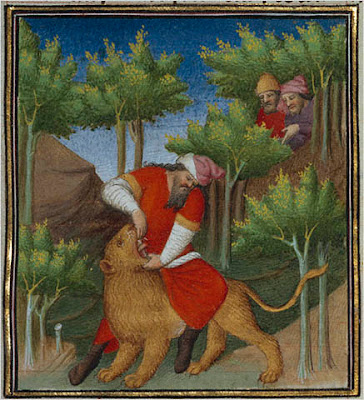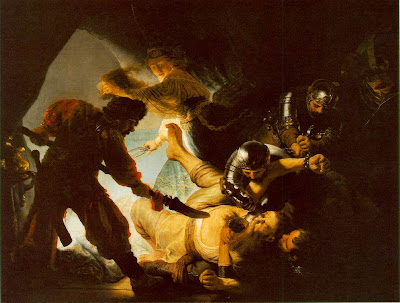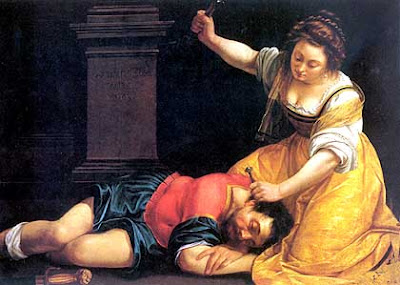Judges 13-16 covers the stories of Samson, an extremely strong Israelite. He has a series of amazing adventures, which fits right in with the Book of Judges' emphasis on vivid tales of action. He is also a vaguely defined religious figure, a Nazirite -- remember Nazirites? -- but although he consistently represents the Israelites by takin' it to the Philistines, their current oppressors, his tactics don't seem to represent any kind of consistent moral standard.
Samson: The Early Years
Samson's birth happens in Chapter 13. The backdrop is that the Israelites have offended God again with their evil ways, and so have been subjected to Philistine overlordship. This is not surprising by now; in their relationship with God, the Israelites have the staying power of a 7th-grade boyfriend. An Israelite woman named "the wife of Manoah," who is infertile, is visited by an angel of God. He tells her that she will conceive a child, that the boy will be a Nazirite, that no razor should ever touch his head, and that he will help bring down the Philistines.
An Israelite woman named "the wife of Manoah," who is infertile, is visited by an angel of God. He tells her that she will conceive a child, that the boy will be a Nazirite, that no razor should ever touch his head, and that he will help bring down the Philistines.
Now, with no disrespect for Mrs. Manoah, an obvious alternative explanation for her sudden fertility springs to mind. And it occurs to me that this same idea must have sprung to the minds of the Israelite audiences of these stories from Judges, which seem designed at least in part to entertain. Is it possible that this story is meant to play both ways, both to establish Samson's cred as a religious figure but also to amuse the free-thinkers around the fire with a little innuendo? Just speculating, here.
The Stormy Marriage of Mr. and Mrs. Samson
When he grows to adulthood, in Judges 14, Samson decides to marry a Philistine woman. His parents respond, as what parents wouldn't, "Isn't there an acceptible woman among your relatives...?" (3), but Samson holds fast. We're told parenthetically that this is according to the plan of God, who is looking for "an occasion to confront the Philistines." (14:4)
At his wedding feast, Samson makes a bet with 30 Philistine guys from his new wife's family that they can't solve his riddle within seven days. Here's the riddle:
Out of the eater, something to eat;Figured it out yet? No, I didn't think so. That's because it is an essentially impossible riddle, as it is based on Samson's personal experience of eating honey from a hive that bees had built in the body of a lion that he had killed (with his bare hands, no less! Remember, he's a stud!). His wife's kinsmen feel, accurately enough, that they are being robbed, so they encourage her to wheedle the answer out of him. Well, they threaten to burn her and her family to death unless she wheedles the answer out of him, actually. These Philistines know how to play rough, too.
out of the strong, something sweet. (14:14)
Mrs. Samson cries all week and accuses her husband of not loving her and so on until, finally, he agrees to explain the riddle. She quickly passes the answer on to the guys, and they rush to claim their prize.
Samson, whose flair for metaphor exceeds his chivalry, says that:
If you had not plowed with my heifer, you would not have solved my riddle. (14:18)Now when you think about it, this is basically admitting that he had been trying to cheat them, but no matter. They have now cheated him, and he is thoroughly pissed off. He pays the bet, which was thirty suits of linen clothing, by going and killing 30 Philistines from the next town over and giving their clothes to his wife's kinsmen, thus taking a lot of the fun out of the wager. Then, still angry, he stalks home to Mom and Dad's house.
Samson's father-in-law, figuring the marriage is off, gives his daughter to the best man. But Samson comes back at harvest time, and he is not at all pleased with this new arrangement, nor receptive to an offer of the more attractive younger sister. He is enraged, and vows to take vengeance on the Phillistines.
It's an effective revenge. He captures 300 foxes -- sounds exhausting, but again: he's a stud -- and ties them together in pairs by their tails. Don't try this at home. He ties torches to each fox pair, then lets them loose in the ripe grainfields. It's an excellent, creative way of destroying an agricultural community, and when the locals learn that Samson's father-in-law provoked the volatile Israelite into it, they burn the father-in-law and his daughter, Samson's wife, to death. Samson is further enraged by this, and vows to take some more vengeance on the Philistines. Raise your hand if you see a pattern developing.
Further revenge involves killing some guys, then pretending to be captured, then bursting out of the ropes that held him with his superhuman strength, and then killing a thousand more guys with the only weapon at hand, a donkey's jawbone. After that, he was leader of Israel for 20 years, since who wouldn't want such a level-headed guy in charge?
Samson in Love
One night Samson is dallying with a hooker in Gaza. Word gets out, and a crowd of his enemies gather at the city gates, ready for ambush. But Samson arrives earlier than expected, and instead of walking up to the gates and asking for them to be opened, the normal procedure, he just rips them off their hinges, drags them through the night, and dumps them on a hill about forty miles away. So, he gets away.
 Sometime later, he falls for Delilah. Now Delilah famously does not have his best interests at heart, and she goes about trying to find the secret of his strength so that she can neutralize him for the Philistines. He keeps lying about this -- "Tie me up with seven fresh thongs, and I'll become as weak as any man" (16:7), and so on -- and she keeps running experiments to find out if he's telling the truth. I guess this is why the story is associated with women who make fools out of men, because even though she goes and tries all of the false methods he suggests will destroy his power, including elaborate ones like weaving his hair on a loom, he still eventually tells her the real way to put him out of commission. The trick, of course, is to shave off his hair.
Sometime later, he falls for Delilah. Now Delilah famously does not have his best interests at heart, and she goes about trying to find the secret of his strength so that she can neutralize him for the Philistines. He keeps lying about this -- "Tie me up with seven fresh thongs, and I'll become as weak as any man" (16:7), and so on -- and she keeps running experiments to find out if he's telling the truth. I guess this is why the story is associated with women who make fools out of men, because even though she goes and tries all of the false methods he suggests will destroy his power, including elaborate ones like weaving his hair on a loom, he still eventually tells her the real way to put him out of commission. The trick, of course, is to shave off his hair.The Philistines capture the shorn and weakened Samson, gouge out his eyes, and toss him in jail. While he languishes, they plan a huge feast at the temple of their god, Dagon, to celebrate his capture. But there's a great Hollywood ending, because while the feast is planned and prepared, nobody thinks to do a touch-up job on Samson's hair. It starts to grow back, a little.
At the big feast, drunk guests call for Samson to be brought out and paraded before them in humiliation. In front of the crowd, he has a servant guide him to a pillar, and then he prays for strength. Between the prayer and the stubbly new hair, he is powerful enough to topple two of the pillars that hold up the temple; the ceiling collapses, killing him but taking hundreds of the best and brightest of the Philistine ruling class with him.
Cinematic stuff! Samson is a strange Bible hero, in that he leads no army and preaches no sermons and, aside from that last prayer, doesn't seem to have a very close relationship with God. He's hot-tempered, chases women, and provokes people to violence because he wants to take revenge on them. All told, he's more like a flawed superhero from one of those dark modern graphic novels than like the other Biblical heroes we've seen to date.
Next Week: Bad doin's among the tribes.
Last Year in Michael Reads the Bible: Jacob wrestled an angel, and the angel was overthrown.





